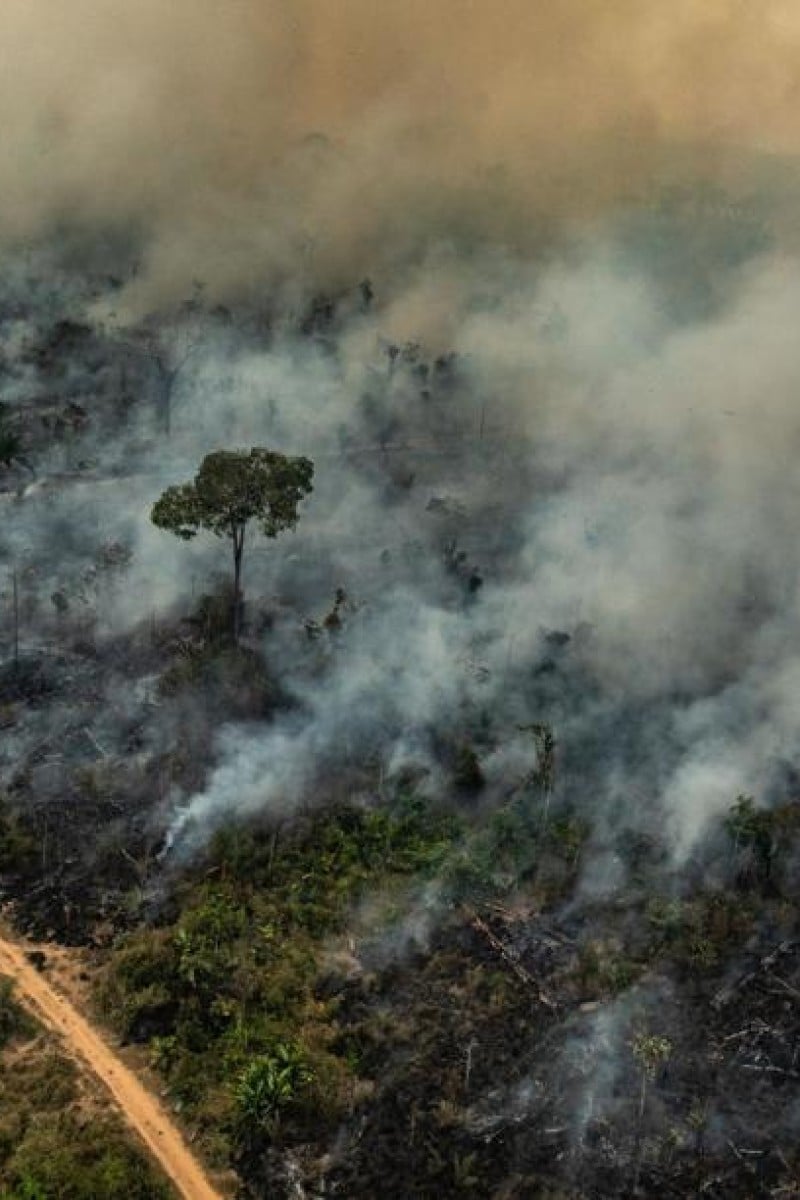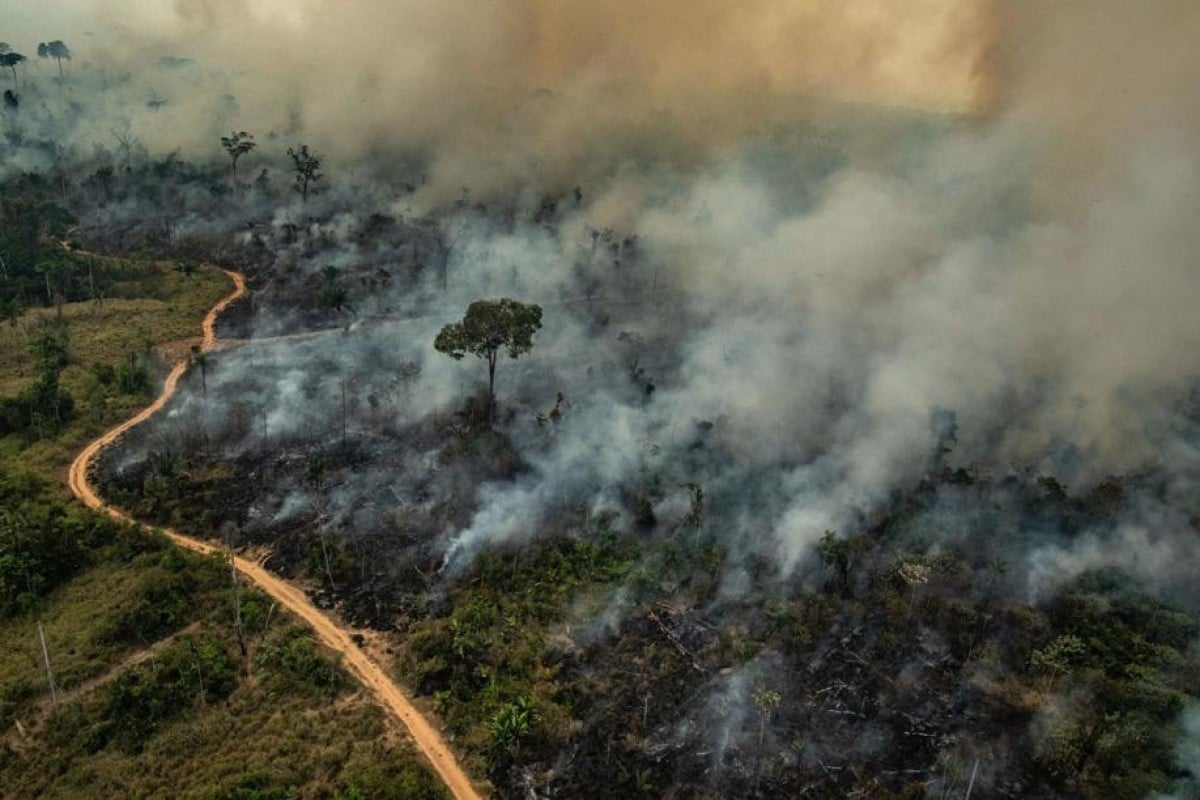
As the fires continue to burn, a meteorologist explains how it impacts global warming, the effects on HK and how you can reduce your carbon footprint
 The destruction of the Amazon rainforest has a devastating impact on the rest of the planet and increases the effects of global warming.
The destruction of the Amazon rainforest has a devastating impact on the rest of the planet and increases the effects of global warming.Thousands of fires are currently wreaking havoc in the Amazon rainforest in Brazil. Many of them have been blazing for months, and it could take months more still to put them out.
Although fires do break out every year in the Amazon region, this year’s are the worst in almost a decade, according to US space agency Nasa. More than 87,000 forest fires were recorded in the country in the first eight months of the year, according to Brazil’s National Institute for Space Research (INPE).
The Amazon is the world’s largest rainforest. It covers some 5.5 million square kilometres, and spans nine countries. It is home to billions of trees, millions of animal species and more than 16,000 plant species. Sadly, the Amazon rainforest is a rapidly disappearing legacy.
In the fight against pollution, your favourite seafood may play a role
Trees are often cut down illegally for their valuable wood. Clearing the trees also creates areas for cattle ranching, soybean farming, and the construction of roads and houses. As of 2018, around 20 per cent of the Amazon had already been lost.
“The Amazon fires act as a reminder and warning to us all,” says Lam Chiu-ying, meteorologist and former director of the Hong Kong Observatory.
He explains that plants play an important role in regulating the levels of carbon dioxide and oxygen in the atmosphere. With such high levels of carbon emissions worldwide, there is a pressing need for more plants to take in the heat-trapping carbon dioxide and reduce the effects of global warming.
“Therefore it’s very unfortunate that during this critical time, the Amazon rainforest is on fire.”
Losing trees doesn’t just mean less carbon dioxide is absorbed; as they burn, they also release all the carbon they have taken in and stored throughout their existence. “Trees act as a safe for the world’s carbon dioxide, as they take it in during photosynthesis,” explains Lam. “If the trees are being burnt down right now, that carbon dioxide will be let loose.”
Lam, 69, warns that Hong Kong is not immune to the effects of global warming. “In the old days, we might treat global warming as a very distant phenomenon. But things have definitely changed. For instance, we have a much higher number of hot nights [nights where the temperature stays above 28 degrees Celsius] each year.”
Lam points out past research has shown that hot nights in Hong Kong coincide with more people being taken to the Accident and Emergency unit in hospitals. Apart from causing discomfort, hot weather can lead to cardiac or respiratory diseases as well.
“When I was born, there were only two to three hot nights per year. But now, the number has increased to around 40. I genuinely feel that the climate in Hong Kong is changing,” says Lam.
Plastic ingestion leads to death of beloved baby dugong in Thailand
Nor are Hongkongers free from blame when it comes to warming temperatures. Lam says that the city’s carbon emissions, including those caused by the production of imported goods, make up around 1/250 of total global emissions. The finding is taken from a 2010 report by Steven J. Davis and Ken Caldeira.
There are roughly 7 million people in Hong Kong – that’s around 1/1000 of the total global population. Yet this research shows that the carbon footprint of the average Hongkonger is four times higher than the average human.
“Shopping is a popular hobby in Hong Kong, but it’s unheard of in other places on earth. Many argue that shopping boosts our economy, but there’s an extra price that we have to pay: more carbon dioxide in our atmosphere,” says Lam. “Hongkongers are responsible for global warming. And the percentage isn’t even small.”
Lam’s advice to Hongkongers wanting to support the conservation of the rainforests is to pay attention to where the food they buy has been imported from. A lot of imported meat comes from cows that graze on lands that were once rainforests. Even when that isn’t the case, the food given to cows may be grown on destroyed rainforest land.
The environmental organisation Greenpeace has called out fast food giants McDonald’s, KFC, and Burger King for importing meat products from Brazil and working with corporations that are responsible for deforestation in the Amazon.
“There are more than 300 McDonald’s, KFC and Burger King shops in Hong Kong,” says Natalie Siniora, the campaign manager at Greenpeace Hong Kong. “We urge them to be more transparent about where their meat is coming from so that consumers may know [whether they are complicit] in such destruction.”
